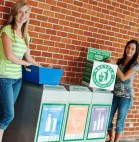By Linda Petee, Sustainability & Risk Management Coordinator, Delta College
(This article appears in the September, 2012 issue of The ACUPCC Implementer)
Scope 3 emissions can escalate a carbon footprint significantly if not monitored and tracked diligently. To provide a comprehensive analysis, Delta College chose to report additional Scope 3 categories, including solid waste, right from the start.
Recycling was introduced in 1991 and our program quickly earned recognition as a statewide best practice in 1995. Early on, area waste haulers were not equipped to collect recyclables and sorting facilities were limited. Our fledgling program partnered with a local rehabilitation center for sorting and bundling. Later, as residential programs took hold, we piggybacked on municipal collections. Eventually, local material recovery centers were established. Having an established program has allowed us to refine our processes and provide guidelines to aid collection.
| Delta College Recycling List & Guidelines |
| Batteries (PDF) |
| Beverage Containers (PDF) |
| Cardboard (PDF) |
| Cell Phones, PDA, MP3 (PDF) |
| Junk Mail and Fax Ads (PDF) |
| Mixed Paper – Public Spaces |
| Mixed Paper – Offices (PDF) |
| Newspaper (PDF) |
| Packing Materials (PDF) |
| Phone Books (PDF) |
| Print Cartridges (PDF) |
| Snack Bags (PDF) |
| Shredding (PDF) |
| Transparencies (PDF) |
Acceptable materials and bin locations are available on our website. Instructional posters are installed in all labs, classrooms, and copy service areas. New employees are introduced to campus greening with a ‘green welcome packet’ and students attend tabling events. The Sustainability Office measures progress and evaluates new materials to strive for maximum diversion by conducting a comprehensive waste stream evaluation including life-cycle assessment, procurement, inventory, and storage. We keep in close contact with the waste hauler for the transfer of waste to the landfill. The landfill reports that 11% of the methane generated by our campus waste is ‘flared off’ while the remaining 89% is used to generate electricity.
Although waste had been tracked since day one, it was the ACUPCC and initial greenhouse gas (GHG) reporting (2000-2008) that clearly demonstrated the benefit. Because of our improved waste stream analysis, education, and better record keeping, we found that from FY06 to FY08 about 15% more materials were being diverted toward recycling or reuse. Our most recent GHG report shows that, on average, diversion has increased about 7% each year. In 2006, seven tons of archival documents were shredded and recycled. The following year, an improved archival and retention process reduced that quantity by half with further reductions each year since. A junk mail reduction campaign, monitored by Eco Reps, reduced unwanted mail by 72% in a single a year.
GHG reporting makes apparent areas that need attention. In our case, it pointed directly to retired furniture, fixtures, and
equipment. The College had operated an asset management process whereby property was evaluated for potential reuse, then resale, recycling, and eventually disposal. It was a labor-intensive process. This year it was streamlined to an efficient online public surplus auction. Items from light fixtures to backhoes now move more efficiently from campus-owned to community reuse.
A closer look at the electronic media waste stream proved both a learning experience and resulted in a more effective method. In the past, e-waste generally found its way to a haphazard pile in the corridor. A newly launched online portal now notifies campus Eco Reps to arrange a meet up. Together, the requestor and the Eco Reps sort, box, and tag the waste. This imparts responsibility and an understanding that what comes in eventually must go out. Adopting a ‘department pay’ system vs. the college picking up the tab encourages prudent planning of product need and consideration for life cycle.
Solid waste management also offers an opportunity for student clubs to fundraise or to donate to charitable organizations. Eco Reps say it’s a great way to create awareness of the Triple Bottom Line. Club members sign up to collect returnable beverage containers. This also requires them to empty the non-returnable receptacles, thus saving Facilities Management labor costs. Clubs have financed projects like alternative spring breaks, conference fees, and team equipment.
Delta College has long been committed to making an investment in campus waste reduction. We hope that through further reduction, repurposing, reuse, and recycling that we one day will be producing zero waste.


Add new comment